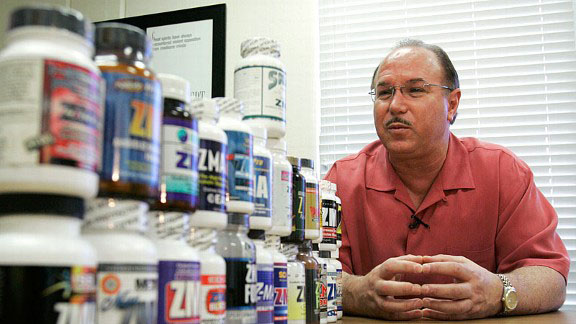The IOC has exposed itself as a toothless tiger. The Olympics' global governing body showed it lacked the moral fortitude and backbone to take a necessary stand against Russia.
By leaving it up to international sports federations to determine if Russian athletes who compete for squads other than the banned track and field team can compete in the Rio de Janeiro Olympics, the IOC has taken two giants steps away from the problem.
It has wiped a few crumbs off the table, so to speak, but left the room without cleaning up the mess after dinner.
IOC president Thomas Bach's announcement last Sunday that it would not impose a blanket ban on Russia for the Rio Games despite overwhelming evidence of a gigantic state-sponsored doping scheme that leaves a dark cloud over the 2014 Sochi Winter Games and Russian athletes who competed there and in the 2012 London Games plus the 2015 IAAF World Championships, among other global competitions. Even after this: The World Anti-Doping Agency shed light on, in the words of Bach, the "unprecedented level of criminality," in recent years by Russia in its doping program.
WADA's McLaren Report, written by Canadian Richard McLaren and released in mid-July, described in painstaking details after a 57-day investigation the full scope of the Russian doping program, including the following: "The State implemented a simple failsafe strategy. If all the operational precautions to promote and permit doping by Russian athletes proved to have been ineffective for whatever reason, the laboratory provided a failsafe mechanism. The State had the ability to transform a positive analytical result into a negative one by ordering that the analytical process of the Moscow Laboratory be altered," the report read.
So what precedent does this now send?
What will other nations — and individuals — get away with in the future?
Jamaica and Kenya have also been under the WADA microscope in recent years due to ineffective drug-testing protocols.
But the elaborate state-sponsoring doping scheme was a massive conspiracy that perpetrated every sector of Russian sports, and thus required the strongest retaliation.
Or as The New York Times noted: "... The idea that a government would harness its scientists, athletes, secret services and bureaucrats to cheat on a scale surpassing even East Germany's infamous Cold War program demands an unequivocal condemnation."
The entire IOC should be outraged, and there ought to be complete disgust by the general public that the Olympic Games were hijacked by cheaters. Instead, we've become numb to doping problems in sports.
For the IOC, its oft-repeated zero-tolerance policy on doping means nothing.
"Every human being is entitled to individual justice," Bach said, summing up the 15-member executive board's decision.
The IOC shied away from its responsibility to lead by example.
How?
By letting 27 international sports federations decide whether to permit Russian athletes to compete. This ushers in anarchy where anything goes, where arbitrary standards and policies, will prevail.
United States Anti-Doping Agency CEO Travis Tygart shed light on the crux of the issue.
"Many, including clean athletes and whistle-blowers, have demonstrated courage and strength in confronting a culture of state-supported doping and corruption within Russia," Tygart said in widely reported comments.
"Disappointingly, however, in response to the most important moment for clean athletes and the integrity of the Olympic Games, the IOC has refused to take decisive leadership. The decision regarding Russian participation and the confusing mess left in its wake is a significant blow to the rights of clean athletes."
BALCO mastermind Victor Conte, who has become one of the most vocal proponents of tougher anti-doping measures in the past decade after being one of the biggest suppliers of performance-enhancing substances to high-profile athletes, delivered a scathing critique of WADA and the IOC.
"I believe it is important to understand the true reason WADA was originally founded," Conte told The Japan Times via email this week. "It was not to protect the Olympic athletes who chose to compete clean. WADA was founded per the request of IOC sponsors to protect their advertising dollars from being tainted by positive drug tests.
"It is my opinion that the Olympic Games have involved corruption and positive drug test coverups for many decades. There has been a financial conflict of interest between the IOC and WADA since WADA was founded before the Sydney Olympics in 2000. This is the very reason for the genuine lack of interest in catching athletes who cheat to win. In short, positive drug tests are simply bad for business.
"The IOC, WADA and international sports federations have been looking the other way as much as possible to protect their own financial interests. The Olympic Games are promoted as fair competitions among the nations of the world. However, the competitions more often than not take place on an unlevel playing field. Hopefully, the day will come when an independent anti-doping entity can be established without such serious conflicts of interest involved."
And don't forget this: Anti-doping officials lack the necessary resources to combat drug cheats. WADA's annual budget: about $30 million, according to the latest figures. (Contrast that figure with this: $1.23 billion, the amount U.S. TV network NBC paid for broadcasting fees for the Rio Games.)
When it's all about the money, and lining already-stuffed pockets of Olympic big shots, the IOC executives' moral stance can only be described this way: faux outrage.
Perhaps The Daily Beast summed it up best in an article earlier this week. "Spineless IOC Surrenders Olympic Integrity to Russia Forever," the website's headline proclaimed.
"IOC president Thomas Bach announced that the committee would not implement the outright ban on Russia competing at the Games, despite the clear evidence that Russian secret agents orchestrated one of the biggest programs of state-sponsored cheating in the history of sport," wrote The Daily Beast's Nico Hines.
Why should anyone take the IOC seriously?
Further reading: A four-part series from 2015: www.japantimes.co.jp/sports/column/the-doping-epidemic/




















With your current subscription plan you can comment on stories. However, before writing your first comment, please create a display name in the Profile section of your subscriber account page.